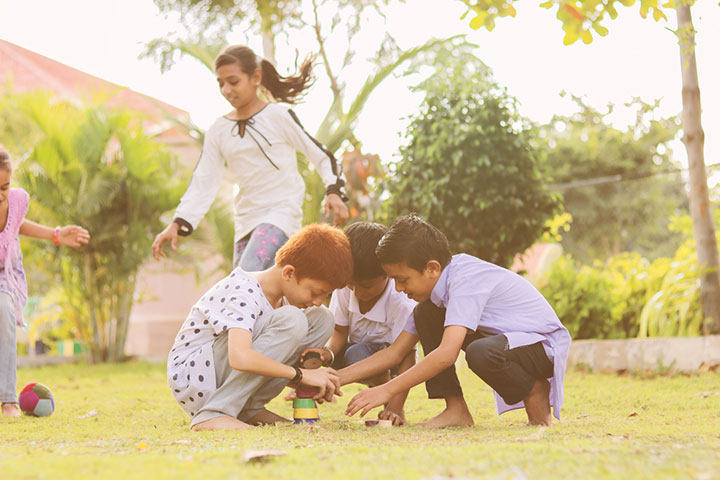Continuities in Childhood and Adult Moral Development

Moral development in childhood may be considered one of the central aspects of socialization. It is a process through which children learn to differentiate the wrong from the right based on society's social and cultural laws and norms. Parents and teachers play an important role in teaching morals to children. Teaching morals at a young age can help raise responsible citizens. However, the understanding and implementation of moral values in children depend on the environment they are raised in and their physical, social, emotional, and cognitive skills. Read this post to learn more about the stages of moral development in children and tips on how parents can help their children learn moral values.
Defining Morality
Morality is the ability to see the difference between right and wrong in intentions, thoughts, actions, and behavior. Teaching this concept to children is the primary goal of parenting. Moral development deals with the concepts of morality that a child learns from infancy through adulthood.
Keep reading to learn about the different stages of moral development in children.
Stages Of Moral Development In Children
Moral growth in children happens gradually as they grow from infancy to teens and older. Let's see that in detail:
1. Infants
Infants cannot moralize. Their sense of right and wrong depends on their feelings and desires. After being provided for nine months in the mother's womb, a baby expects the nurturing to continue. As a result, their sense of rightness depends on whether or not their needs are met.
- Hunger and loneliness are uncomfortable feelings for your infant and do not feel right.
- Being attended, cuddled, and fed feels right, while unresponsiveness is scary and wrong.
2. Toddlers
Age: 2 to 3 years
At this age, your toddler realizes that others have rights and needs as well. However, he is yet to grasp the difference between right and wrong. A aged 2-3toddler might show empathy-based guilt and moral behaviors. Depending on the actions conveyed by parents, the toddler understands obedience is the norm.
- Your toddler knows that it is wrong to take away a toy from a sibling only because he might land himself in trouble.
- While he may not understand why hitting someone is wrong, he knows that he will be punished for doing that.
- Your toddler tends to follow the rules to avoid punishment.
3. Preschoolers
Age: 3 to 5 years
This is the age when your child internalizes family values.
- Since rules and norms are essential for discipline in the family, they become important for your child too.
- Your child expects older people, or parents, to take charge.
- They understand the role of a "child" and an "adult" and expect maturity to be directed towards them.
- The child recognizes that actions have consequences – "If I do this, this will happen."
- Positive parental direction makes the child connected, and he behaves well. The unconnected child will do what he feels like, unless and until he doesn't get caught.
4. Kids
Image: iStock
Age: 7-10
After the age of 7, children start questioning if the people who hold authoritative positions, such as teachers and parents, are infallible.
- Your child will develop a strong sense of what he should and should not do. They would want to participate in making rules.
- Children of this age develop a sense of fairness and understand the necessity of rules.
- They understand children have rights as well and they filter rules according to what suits them.
5. Teens
As they get closer to adulthood, children start to develop their own moral values, while questioning and analyzing the ones that their parents set for them.
Age: 11-16
- Your adolescent will expand his moral horizon and see rules as a set of social guidelines that benefit all.
- They value rules but also negotiate.
- They become interested in what's good for the society at large as they develop their abstract reasoning abilities.
- Your adolescent will start realizing that the decision he takes affects others around him.
- Your teen will want to be accepted by peers and may alter or change his values and morals that further that cause.
- The cycle goes from "I do this because I find it right" to "I do this because my family does it" to finally- "I do this because this is right."
Moral development is not as simple as teaching values to children. It is so complicated that psychologists have come up with theories on them.
Piaget's Theory of Moral Development
According to Jean Piaget, a psychologist whose primary work was in child cognitive development states that children go through two major stages of moral judgment (1), (2).
He called the first stage, up to seven years of age, Heteronomy, where there is a morality constraint. After seven years, the stage of Autonomy sets in gradually.
Piaget has observed that a child's moral development depends on his cognitive skills, and hence divided the process into the following stages:
Sensorimotor stage: Birth to 2 years
- The child understands the world in accordance to his motor development
- He coordinates experiences through physical interaction such as seeing, sucking, and grasping
- The child develops 'object permanence' where he understands that an object exists even when it cannot be seen, touched, or heard
Preoperational stage: 2 to 7 years
- The child lacks the ability to decenter, meaning that all his actions are driven by the understanding that he should be provided for
- Logically inadequate for mental operations
- The child's thinking is egocentric, meaning he cannot understand others' viewpoint
In the above two stages the child is still not capable of distinguishing between what belongs to him and what belongs to the others. Hence, he wants everything for himself and is fussy about it.
Concrete Operational stage: 7 to 11 years
Image: iStock
- Does not have the ability of abstract reasoning
- During this process, the child's mental representation increases extraordinarily
- Rapid acquisition of language due to cognitive symbolic development
- Elimination of egocentrism
Formal Operations stage: 11-12 years
- The child begins to reason abstractly
- Physical representation and mental representation
In the operational stages, the child is able to see things from a third person's perspective. He understands the importance of cooperation, reciprocity and equality. This is when he transforms from Heteronomy to Autonomy.
Kohlberg's Theory of Moral Development
Lawrence Kohlberg, a Harvard professor of psychology, has propounded an ethical development theory with the below stages (3):
- Stage 1: Punishment-obedience orientation: Young children behave righteously because they fear authority and follow the rules to avoid punishment.
- Stage 2: Egoism/individualism: The right action is that which satisfies one's own needs and sometimes those of others. Reciprocity at this stage is not about loyalty or justice.
- Stage 3: Good boy/nice girl: The right action is that which pleases and impresses others. The individual is concerned about the impression he leaves on others, and seeks others' approval with his good behavior.
- Stage 4: Law and order orientation: The right behavior means doing one's duty, obedience to social norms for its own sake, and respect for authority.
- Stage 5: Social contract orientation: The child recognizes universal principles, individual and basic rights and societal norms. Aside from what is agreed upon as correct, right action is also about personal values and opinions.
- Stage 6: Universal ethical principle orientation: The right action is decided by the individual's conscience in accordance with self-chosen ethical principles.
Kohlberg termed stages 1 and 2 as preconventional morality, stages 3 and 4 as conventional morality and the last two stages as postconventional morality.
Carol Gilligan's Theory of Moral Development
Gilligan, a student of Kohlberg, has observed that Kohlberg's study was based only on boys and men. She had said that women and men differ in their moral and psychological tendencies. Whereas men think in terms of rules and justice, women consider caring and relationships (4). So, she came out with her own set of stages:
- At the preconventional stage, the child's aim is individual survival
- Then she acquires a sense of responsibility for others
- At the conventional stage, the individual is fine with self-sacrifice
- Then she realizes that she is a person too, and hence the transition from being good to truth
- At the postconventional, she understands she does not hurt herself or anyone else.
Skinner's Theory of Moral Development
Image: iStock
Skinner's theory is based on behaviorism (5):
- The outside world is crucial in shaping a child's inner sense of morality.
- Socializing is a key attribute of moral development in children.
There have been several theories on moral development. The crux is parents and the environment in which children grow up have an impact on their morality.
Parents' Role In Moral Development Of Children
Children learn morality from the people they are closest to. Therefore, this is what you can do:
- Motivate your child to act within the acceptable norms.
- Identifying and acknowledging the emotions in the early stages will help your child know you empathize with them.
- Praise your child whenever they act positively and demonstrate morally correct behavior. This will help them know what is expected of them.
- Your children look up to you and follow you closely. So, practice what you preach and be the role model they need you to be.
Image: iStock
In addition to being a role model and encouraging, you need to teach them basic moral behavior.
Teaching Moral Values To Children
It is not easy to make children understand and internalize the moral values you teach them is not practical. Here are some tips to do that (6):
- Explain the morals that you think are of utmost importance.
- Teach your child how misbehavior affects others and how it might affect him too. For example:"If you are lying, one day no one will believe you."
- Talk to your child about hypothetical situations where they will have to assess their thoughts and make a choice. Let's say, "Your friend is getting bullied, what would you do?"
- Teach that good morals have good consequences.
- Make sure that you, as a parent, keep your commitments and promises, and show kindness to your child.
- Be an example yourself or your child is likely to get confused.
- Make your child take up some moral development activities.
Moral Development Activities
You may encourage your child through several individual, group and educational activities to bring out the best in them. Games can teach children about cooperation and equality.
- Group games, such as hide-n-seek, running race, aiming games, et al, encourage children to understand the importance of rules and fair play.
- Through group games, children can learn that rules are ethical, and they should follow them not for avoiding punishment, but because they are right.
Image: iStock
- A game of tic-tac-toe is yet another excellent game for children, especially for infants and toddlers. Participate in the game to show that you are not an authoritative figure.
- This game helps children learn that some decisions and actions are in their hands and not everything they do is imposed by someone.
Was this article helpful?
The following two tabs change content below.
- Reviewer
- Author

Sagari was a math graduate and studied counseling psychology in postgraduate college, which she used to understand people better. Her interest in reading about people made her take up articles on kids and their behavior. She was meticulous in her research and gave information that could be of help to parents in times of need. An animal lover, vegan, and... more

Dr. Wayne Hough is a pediatrician currently based in the Northern Suburbs of Cape Town in South Africa. He got his medical degree from the University of Stellenbosch. He then worked at the Tygerberg Children's Hospital before completing his pediatric training and qualification from the South African College of Medicine. Dr. Hough also holds a MMed degree in pediatrics from... more
Source: https://www.momjunction.com/articles/stages-of-moral-development-in-children_0082017/





0 Response to "Continuities in Childhood and Adult Moral Development"
Post a Comment